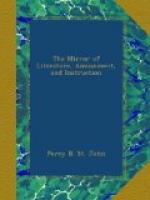The work, as our readers may imagine, is from first to last, an ever shifting round of adventure. It has its dark shades as well as its lively tints. The Great Plague and Fire furnish ample materials for the former, as do the court beauties and intriguantes for the latter. An episodal narrative of the Plague is one of the most touching pieces in the whole work. At present we subjoin one of
The Great Fire.
“I was pondering one night, as I was sitting in the parlour at Mickleham,[1] looking at a beautiful moon, and delaying to go to bed, when Bennett came in and told me, that there was a dreadful fire in London. One of the tradesmen had brought news of a dreadful fire the day before; but as every fire was dreadful, and I had seen the good people of London run away from a cow, crying out, a “mad bull,” I had thought nothing of it, and was prepared to think as little of the new one. The old gentleman, however, assuring me that both fires were one and the same, that it had burnt a whole night and day, and was visible as far as Epsom, I thought it time to see into the truth of the matter. I ordered my horse, and promising to bring back a correct account, purely to satisfy the house that there was no such thing, (for some of the domestics had kindred in London,) I set off at a round gallop, looking towards the north, as if I could already discern what I had doubted. Nobody was stirring at Leatherhead; but at Epsom, sure enough, there was a great commotion, all the people being at their doors, and vowing they saw the fire; which, however, I could not discern. That there was a fire, however, and a dreadful one, was but too certain, from accounts brought into the town both by travellers and the inhabitants; so with the natural curiosity which draws us on and on upon much less occasions, especially on a road, I pushed forward, and soon had pretty clear indications of a terrible fire indeed. I began to consider what the King might think of it, and whether he would not desire to have his active servants about him. At Morden the light was so strong, that it was difficult to persuade one’s-self the fire was not much nearer; and at Tooting you would have sworn it was at the next village. The night was, nevertheless, a very fine one, with a brilliant moon.[2] Not a soul seemed in bed in the villages, though it was ten o’clock. There was a talk of the French, as if they had caused it. By degrees, I began to meet carts laden with goods; and on entering the borders of Southwark, the expectation of the scene was rendered truly awful, there was such a number of people abroad, yet such a gazing silence. Now and then one person called to another; but the sound seemed as if in bravado, or brutish. An old man, in a meeting of cross-roads, was haranguing the people in the style of former years, telling them of God’s judgments, and asserting that this was the pouring out of that other vial of wrath, which had been typified by the Fiery Sword,—a spectacle supposed to have been seen in the sky at the close of the year sixty-four. The plague was thought to have been announced by a comet.




